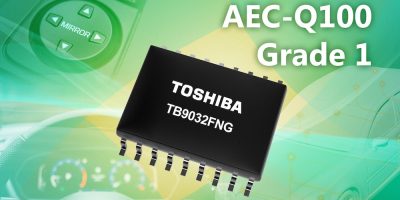Automotive CXPI comms driver IC reduces wiring requirements
An automotive clock extension peripheral interface (CXPI) communication driver / receiver IC has been released by Toshiba Electronics Europe. The TB9032FNG is for applications within automotive body systems, such as steering switches, instrument cluster switches, light switches, door locks and external mirrors, advised Toshiba.
Today, automotive body system applications require high speed operation, operating significantly faster than earlier LIN (local interconnect network) technology.
Devices based on ISO 20794-4, the CXPI standard, deliver 20kbits per second multiplex communication for network interfaces within automotive body system as well as for zone ECUs. This allows for reduction of wiring within vehicle harnesses, saving cost, space and weight, said Toshiba.
This will support the physical layer interface for automotive communication protocols that comply with the CXPI standard. For battery-based systems, the TB9032FNG design will have a built-in sleep mode that reduces current consumption (IBAT_SLP) to a typical value of just 5.0 microA during standby. A number of fault detection functions will be offered, including over-temperature and low voltage detection.
Operating temperature range will be -40 to +125 degrees C to ensure suitability for the harsh automotive environment. The design is undergoing conformance testing to AEC-Q100 (Grade1), to demonstrate suitability for demanding automotive body applications.
The TB9032FNG is in a P-SOP8-0405-1.27-002 package. Its footprint of just 6.0 x 4.9mm makes it suitable for space-constrained automotive applications, added Toshiba.
Samples will be available via Toshiba representatives for evaluation. Mass production is expected in early 2024.
Toshiba Electronics Europe is the European electronic components business of Toshiba Electronic Devices and Storage. It offers European consumers and businesses a wide variety of hard disk drive (HDD) products and semiconductor solutions for automotive, industrial, IoT, motion control, telecomms, networking, consumer and white goods applications. The portfolio also encompasses power semiconductors and other discrete devices ranging from diodes to logic ICs, optical semiconductors as well as microcontrollers and application specific standard products (ASSPs).
TEE has headquarters in Düsseldorf, Germany, with branch offices in France, Italy, Spain, Sweden and the United Kingdom providing marketing, sales and logistics services.




